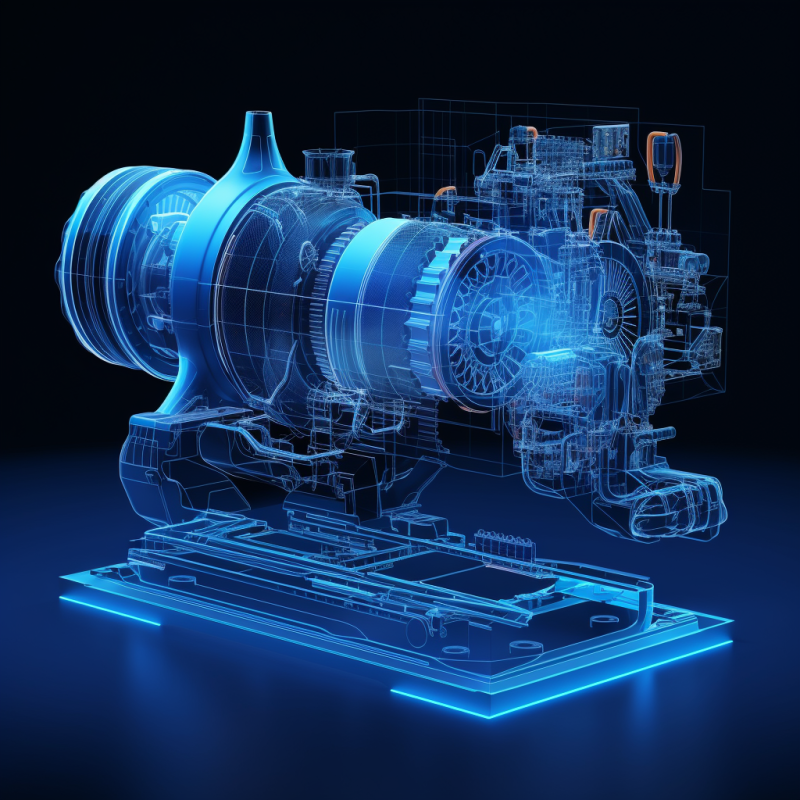Smart Factory: Revolutionize your production for Industry 4.0
Terms such as “Industry 4.0” and “Smart Factory” have received increasing attention in the manufacturing industry in recent years. Technology has changed the way we manufacture and has opened the door to a new era of industrial manufacturing.
In a Smart Factory as part of Industry 4.0, machines, plants and systems are networked with each other to achieve continuous and automated production. The data collected during the manufacturing process can be used to improve the efficiency and quality of production.
This technology enables companies to produce more reliably and faster without compromising on quality. The Smart Factory is an important step towards sustainable and efficient production for Industry 4.0.
Key Takeaways:
- The Smart Factory is revolutionizing the way we produce.
- In a smart factory, machines and plants are networked with each other to achieve continuous and automated production for Industry 4.0.
- Data collected during the manufacturing process can be used to improve production efficiency and quality.
The advantages of automation in the Smart Factory
In Industry 4.0, automation is an essential factor for success in production. Through automation in the Smart Factory, companies can achieve higher productivity and efficiency as well as save costs.
- Increased productivity: One of the main benefits of automation is increased productivity. By using robots and automated systems, companies can improve their production efficiency and manufacture more products in less time.
- Improved quality: Automated systems are able to ensure higher accuracy and consistency in production, resulting in better product quality. Errors that can be caused by human error are minimized or even eliminated.
- Cost savings: Automation can also save costs by reducing the need for labor and increasing production efficiency. Since fewer workers are needed, companies can also save on personnel costs.
- Reduced downtime: By using automated maintenance systems, companies can minimize downtime. Automated systems can also detect problems before they lead to failure, allowing companies to be proactive and avoid potential issues.
Automation in the smart factory is an important step for companies to optimize their production and achieve competitive advantages.
However, it is important that companies make the necessary investments and ensure that their employees have the skills to use and maintain the new technologies.
Do you already know the successor to Industry 4.0? Read more about the Industrial Metaverse.
The role of data analytics in the smart factory
Data analytics is an important component of the Smart Factory in the age of Industry 4.0. By integrating data analytics into production processes, companies can gather and use valuable information to optimize their production.
Advantages of data analysis
Data analysis in the Smart Factory offers numerous advantages. It enables companies to identify changes in real time and react to them quickly. In addition, companies can increase the efficiency and productivity of their production by analyzing data.
With the help of data analytics, companies can also gain insights into customer needs and adapt their products to meet the requirements. By analyzing Big Data, companies can also identify new trends and developments and drive innovation.
Data analysis challenges
Although data analytics in the smart factory offers many benefits, there are also challenges to overcome. One of the biggest challenges is to extract meaningful information from the vast amounts of data that are generated.
Organizations need to ensure they have the right analytics tools and technologies in place to effectively leverage their data.
Another problem with data analysis is data security. Companies need to make sure they keep their data secure and protect it from cyberattacks.
The importance of networking in the smart factory
The networking of production processes, machines and systems is a central element of the Smart Factory and Industry 4.0. Through the intelligent linking of data and information, greater transparency and efficiency is achieved.
The importance of communication
Communication between the various components plays an important role here. Networking enables machines and systems to communicate and cooperate with each other independently. For example, machines can automatically pass on orders to other machines and thus optimize production.
The advantages of networking are:
- Optimization of production processes
- Reduction of errors and rejects
- Saving time and costs
- Ability to monitor and control in real time
Despite the many benefits of networking, there are also some challenges. One major challenge, for example, is the security of data transmission.
Since a lot of data in the smart factory is transmitted via the Internet, appropriate security measures must be taken to prevent data misuse and hacker attacks.
In addition, all components of the smart factory must also be compatible with each other in order to ensure smooth cooperation. In this context, questions of standardization and interoperability must also be clarified.
Networking in the smart factory offers many advantages, but also some challenges. However, appropriate measures can reap the benefits and overcome the challenges.
The role of artificial intelligence in the smart factory
When it comes to improving production and minimizing errors, artificial intelligence (AI) plays a crucial role in the smart factory. With the help of AI, production can be automated and human errors can be avoided.
For more information on AI in the midmarket, see this article: AI in the Midmarket.
The advantages of AI in production
There are various advantages to using artificial intelligence as part of an Industrie 4.0 strategy:
- AI can help improve product quality by monitoring the process and identifying weak points.
- Production can be optimized because AI-based systems are able to monitor the condition of machines and equipment and detect changes at an early stage.
- AI can also help optimize logistics and inventory by analyzing data in real time and making predictions about demand and availability.
The future of AI in production
The possibilities of AI in production are far from exhausted. Experts believe that AI-based systems will become even more integrated into production in the future and will be able to control and optimize complex processes.
In addition, AI will also play an important role in robotics and machine learning by enabling machines and robots to make decisions on their own.
The role of AI in the Smart Factory and in Industry 4.0 is therefore of great importance and will become even more significant in the future. Companies that invest in this technology will have a clear competitive advantage and will be able to make their production even more efficient and environmentally friendly.
The digital transformation in the smart factory
The Smart Factory represents a revolution in production and enables companies to improve their productivity and efficiency. Digital transformation plays a crucial role in this.
Digitalization of production
With the Smart Factory, production is becoming increasingly digitalized. Companies rely on automated processes and networked production facilities.
The integration of new technologies such as cloud computing, IoT, artificial intelligence and data analysis makes it possible to optimize production processes and respond more quickly to market needs.
Change in business models
The digital transformation is not only changing production, but also the business models of companies.
By using data and new technologies, companies can develop innovative products and services and open up new business areas.
Necessity of cooperation
Digital transformation requires close collaboration between a company’s departments, from development to production and sales. Only in this way can data be used effectively to optimize processes and drive innovation.
Strengthen competitiveness
The digital transformation in the smart factory is a decisive factor in strengthening the competitiveness of companies. Those who do not invest in digital transformation will fall behind the competition in the long term.
The role of the Internet of Things (IoT) in the Smart Factory
The Internet of Things (IoT) plays a crucial role in the Smart Factory Industrie 4.0. It enables the integration of machines, sensors and devices into the network and creates a uniform database.
By using IoT technology, companies can increase the efficiency of their production and save costs at the same time. Machines can communicate with each other and exchange important data in real time to optimize processes and avoid bottlenecks.
IoT sensors also allow companies to gather important information about production processes, such as the condition of machines, power consumption and product quality. This data can be used by companies to make informed decisions and optimize production.
IoT and Big Data Analytics
The use of IoT technology in the Smart Factory and Industry 4.0 generates a large amount of data. To use this data effectively, it is important to use Big Data analytics tools.
Big Data analytics tools can help companies identify patterns in data and gain insights into their production processes. For example, companies can make predictions about the condition of machines and plan maintenance work before downtime occurs.
IoT and the Cloud
The use of IoT technology in the smart factory also requires the storage and processing of large amounts of data. This is where cloud computing comes in.
Cloud computing enables companies to store and process their data securely and cost-effectively. Because the data is stored in the cloud, companies can access it from anywhere in the world and monitor their production in real time.
By using cloud computing in conjunction with IoT technology, companies can make their production even more effective and focus on their core business.
The Role of Predictive Maintenance and Augmented Reality in the Smart Factory
In the Smart Factory, there are a large number of processes that need to be monitored and maintained to ensure smooth operations. This is where predictive maintenance and augmented reality come into play.
Predictive Maintenance
Predictive maintenance allows companies to predict future maintenance needs by collecting and analyzing data from sensors and other sources. This data is used to predict when machines need maintenance before they fail and cause expensive downtime.
Thanks to predictive maintenance, companies can better plan and optimize the maintenance of their machinery and equipment. This reduces downtime, increases productivity and lowers costs.
Augmented reality
With augmented reality, employees in the smart factory can better plan and execute their work. By using AR glasses or other devices, employees can project important information such as step-by-step instructions or technical drawings onto their surroundings.
This enables employees to complete complex tasks faster and more efficiently because they have instant access to relevant information.
Reducing errors and accidents improves workplace safety and increases overall production efficiency.
Want to learn more about AI?
Conclusion: Smart Factory as part of Industry 4.0
The Smart Factory brings many advantages and will revolutionize production. Automation allows companies to increase efficiency and get their products to market faster.
Data analysis helps provide important insights that contribute to improved production.
The networking of machines and devices as well as the application of artificial intelligence and cloud computing enable even more intelligent production. Digital transformation makes companies fit for the future and enables them to successfully meet the challenges of Industry 4.0.
The Internet of Things and predictive maintenance offer further opportunities to optimize production, and augmented reality can help employees troubleshoot problems.
In summary, the smart factory will play an important role in the future development of the industry. Companies that rely on the new technologies at an early stage can gain a competitive advantage and successfully compete in the marketplace in the future.
FAQs on AI in the midmarket
A smart factory is a highly automated factory that enables efficient and flexible production through the use of state-of-the-art technologies and digital systems.
Industry 4.0 is a concept that describes the integration of intelligent machines, digital networking and data analysis in production to increase efficiency and productivity.
Automation enables more efficient production, reduced error rates, better utilization of resources and increased flexibility in adapting to customer requirements.
Data analysis enables monitoring and optimization of production processes, as well as prediction of maintenance needs and quality issues to reduce downtime and improve product quality.
Artificial intelligence enables machines to learn complex tasks and make decisions on their own to optimize processes, improve product quality and reduce costs.



